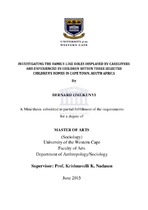| dc.description.abstract | Dawes (2011) claims that there are more than 5.2 million children who were in both institutional and foster care in South Africa by 2011, which was increasing by 6.2% every year due to the HIV epidemic and high levels of poverty affecting the community. In the light of the large number of children in foster care, this study investigates the family-like roles displayed by caregivers and experienced by children within three selected Children's homes in Cape Town, South Africa. In this study, the term "family-like roles" was used interchangeably with "family values" displayed or instilled by caregivers within the children's home. Relatively a number of studies in child care have advocated for the benefit of family-like roles in children’s homes. The study established the importance of family-like roles, and it is evident that children's homes with a large group of children often prevent the creation of a nurturing environment with the characteristics of a family. The study employed interviews and observations to collect data, which were analysed according to the research questions by making codes and themes. The study involved the caregivers, children and managers of the three selected children's homes from Khayelitsha Township, Sothern and Northern suburbs of Cape Town. Furthermore, data were examined from both structural functionalism and eco cultural perspective, which helped to understand that caregivers display or instill the family values in a formal rather than in an informal way. This is because of the structure and functioning of the institutions of care, which makes the caregivers not to act naturally when taking care or displaying the family-like roles for vulnerable children to experience. Despite the negative declarations made in various scholars' studies about children’s homes, this study confirms the opinion of the caregivers that if the children living in the children's homes are shown respect, love, care, trust and kind treatment, they are able to extend these values to other people around them. Yet, this is not realised should the houses-units/cluster or cottages be overcrowded. In addition, the family-like roles displayed by caregivers in these particular children's homes may lead the children to develop a certain kind of phobia. This is a situation where the vulnerable children may develop a total fear and anxiety of certain social conditions in the communities | en_US |

